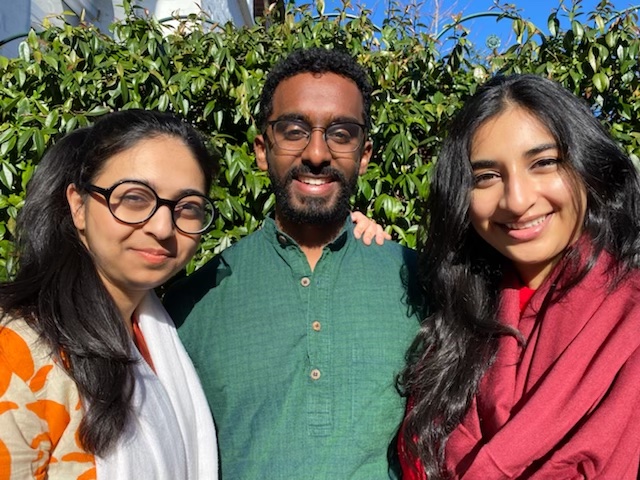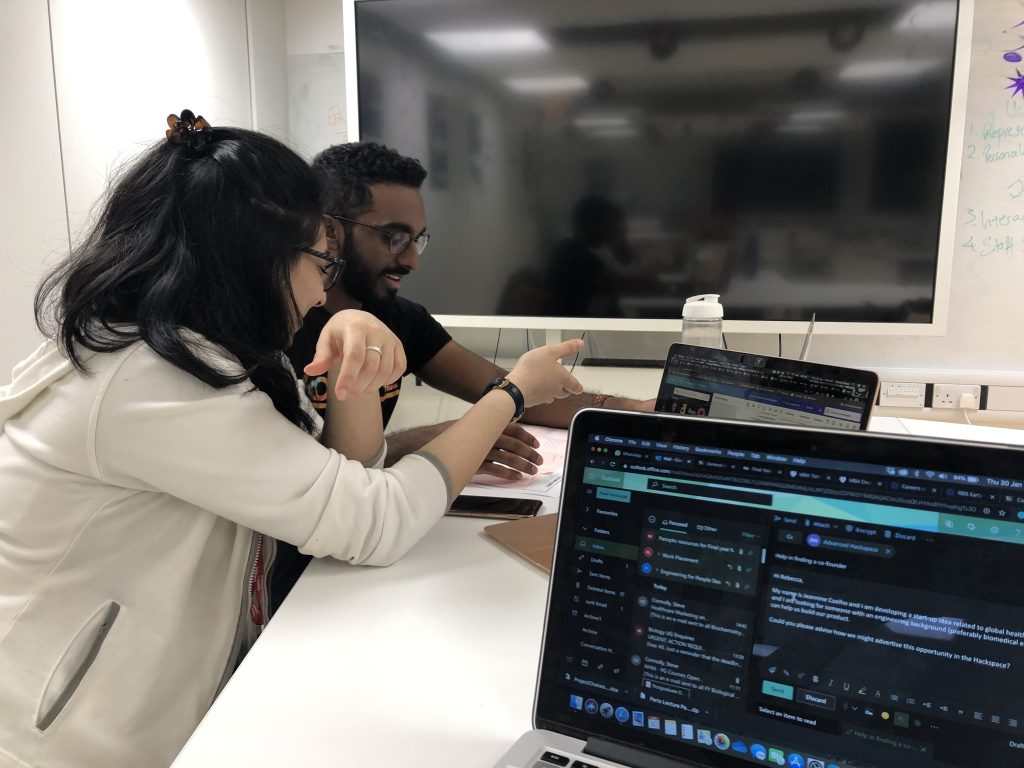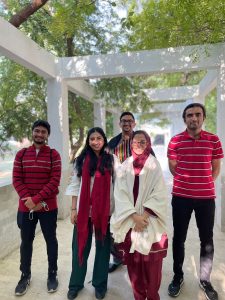
During our final year at Imperial College London, the three of us – Akhilesh, Jeannine and Hansa – came together with the vision to reduce healthcare inequity. Akhilesh was born and raised in London and is of Sri Lankan heritage. Hansa was born in India where she remained well into her teenage years and then immigrated to the UK with her family to finish high school, and has been in the UK for nearly a decade. Jeannine was born and brought up in Pakistan, where she is currently based, and spent four years at Imperial in the UK. So we have always known we wanted to break startup norms by starting off a business in a low-income country and then expanding that to the UK. We were born global.
Our journey started with an application centred on reducing the extreme mortality rate of burn wound patients in Pakistan to the Imperial College London WE Innovate pre-accelerator. We were overjoyed to be among the top 25 teams selected for the WE Innovate programme from over 200 applicants, but quickly realised from interviewing patients that they would not buy our product even if we built something that worked exceptionally well.
So about five months in, we were thrown into an existential crisis. If no one even cared then what was the point? Should we just drop out of WE Innovate and move on with our lives? In that moment, we were reminded of the team’s vision: reducing healthcare inequity. This meant that as long as healthcare inequity exists, our team has a purpose and work to do. But we only had about two months to come up with a new innovative hypothesis, test it and build a plausible business case if we wanted to remain in the running for the £15k WE Innovate prize.
A two-pronged approach
We took a two-pronged approach. We conducted in-depth analyses of healthcare business models across the globe to learn from what has already been done. We also interviewed stakeholders from all sides of the Pakistani healthcare landscape: medical students, nurses, surgeons, GPs, high-income patients and low-income patients. The results were clear – patients hated travelling to and waiting at hospitals, and hospitals were overburdened and under-resourced.
Although home-based and telemedicine interventions exist, they are usually limited to primary care and patients continue to be forced to visit hospitals for specialist secondary care. They also tend to cut out in-person interactions, which reduces the trust the patient has in the solution and creates a technological barrier for older and poorer patients, therefore contributing to inequity. This holds true across all geographies and demographics. Hence, a low cost, home-based but in-person solution targeting secondary care would be a win for all sides, and could be expanded out of Pakistan to the rest of the world. But what would such a solution look like?
We pivoted twice more before finally honing in on home-based cardiac rehabilitation. 34 people die from cardiac diseases every minute, and 75% of that mortality is concentrated in low-income countries. Discharged bypass, stent and heart attack patients are highly motivated to avoid going through a traumatic acute event again but still drop out from follow-up care because of the inconvenience of having to repeatedly visit hospitals. This puts them at a 26% greater risk of dying from a secondary acute event, most of which are preventable.

Personalised cardiac rehabilitation

At Sukoon (meaning “stress-free” in Urdu), our first product offers personalised cardiac rehabilitation (CARE™) in-person, on-demand and at home so that heart patients receive affordable, stress-free care. 93% of the 38 patients we interviewed at Pakistan’s National Institute of Cardiovascular Disease said they would like home visits and 76% said they would pay for home visits.
Cardiologists refer their recently discharged patients to Sukoon, who then use WhatsApp or SMS to organise a 45 minute home visit from a Sukoon nurse. Our nurse uses the CARE™ web app to conduct an in-depth patient assessment, set goals and provide personalised exercise programmes, nutritional advice, mental wellness techniques and information on their disease. Patients have fortnightly visits over 12 weeks to receive cardiac rehabilitation, quantify their progress and set new goals.
A single home visit using a paper-based prototype of our web app resulted in all three heart patients reporting feeling greater independence and improved self-care. Since then, we have secured ethical approvals and signed clinical research contracts with three hospitals and recruited a team of four while bootstrapping the research. Within the last month: four cardiologists have agreed to refer patients to us; we were contacted by a patient to arrange a session; and we were also approached by three further hospitals towards revenue generating partnerships – so we’re excited to be at the cusp of generating revenue!
Watch the video below to find out more about how it works:
[youtube https://www.youtube.com/watch?v=Bb-HswNCjo4]
Winning the Health Innovation Prize
We won £500 from WE Innovate 2020 and also held a successful crowdfund during Ramadan.
However, the IGHI Health Innovation Prize 2022 top prize of £10,000 has really helped catapult progress in securing legal help for contracts, IP protection, incorporation, and regulatory compliance – all critical to ensuring that Sukoon’s operations are fully compliant and future-proofed. We will also use these funds to pay nurses to deliver the software-driven CARE™ to patients during the ongoing soft launch, which will enable us to generate data to support our business case and help us in a pre-seed fundraise aimed at investors later in 2022.
Next stop? >1 paying patients. And 10 times growth.
By Hansa Shree, Akhilesh Sivaraman, Jeannine Coelho
Find out more about past winners of the Health Innovation Prize.